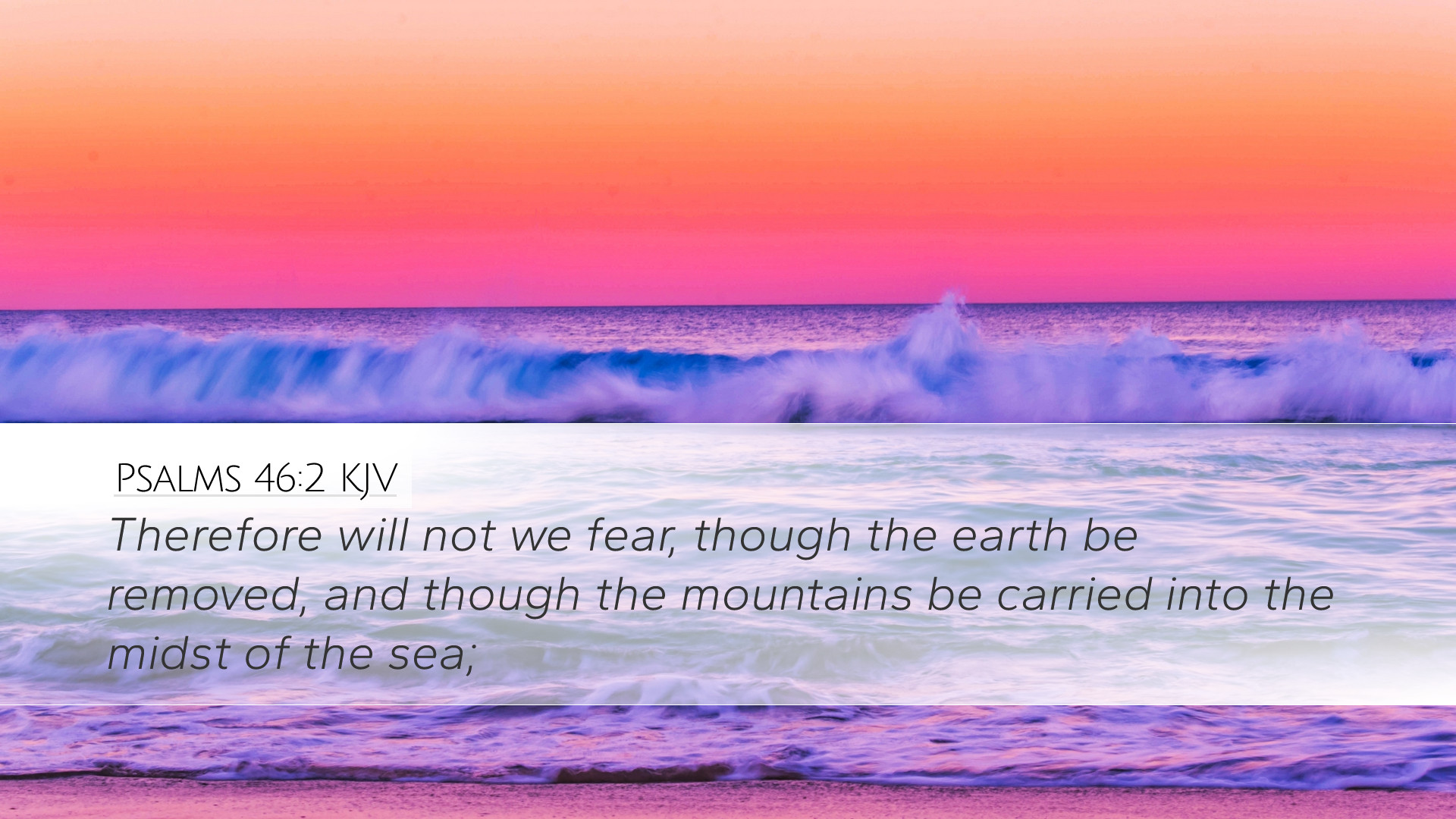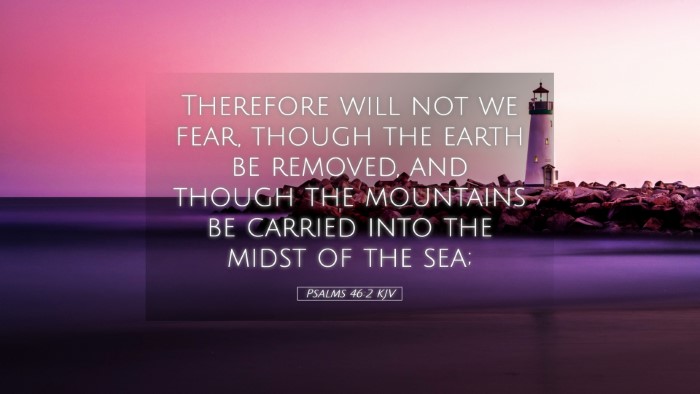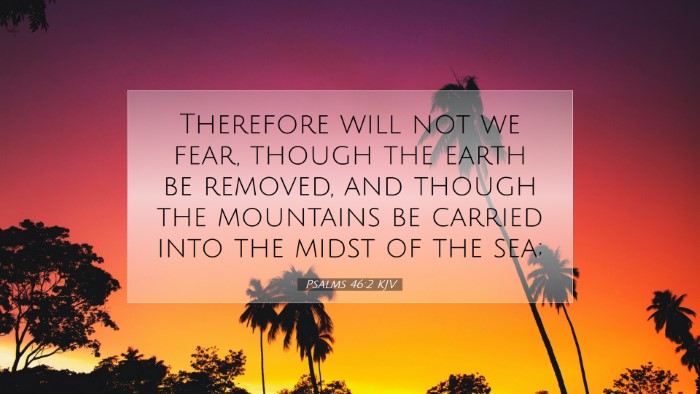Commentary on Psalms 46:2
Psalms 46:2 reads: "Therefore will not we fear, though the earth be removed, and though the mountains be carried into the midst of the sea."
Introduction
This verse from Psalms 46 encapsulates a profound theological and existential truth. The psalmist expresses an unwavering trust in God despite chaotic circumstances. In this commentary, we will explore interpretations and insights from notable public domain commentaries, paying particular attention to the implications for faith in times of distress.
The Context of Psalms 46
The context of this Psalm is crucial for understanding its message. It is traditionally attributed to the sons of Korah, and it reflects a time when Israel faced significant turmoil, possibly during military threats or natural disasters. The overarching theme is one of assurance in God’s sovereignty and refuge, highlighting the contrasts between human fear and divine security.
Exegesis of the Text
The phrase "Therefore will not we fear" sets the tone for the entire verse. This declaration of confidence is rooted in the preceding verses that establish God as a refuge and strength:
- Confidence in God: The assurance of faith manifests as a powerful antidote to fear. Even when the "earth be removed," implying catastrophic events, the righteous find solace in God’s presence.
- Imagery of Chaos: The mention of mountains being "carried into the midst of the sea" invokes imagery of a world turned upside down, symbolizing instability. This chaos, however, cannot shake the believer who is anchored in God's promises.
- Theological Themes: This verse stands as a testament to the transcendence of God over nature and circumstances, asserting His ultimate authority over the creation and the peace He provides to His people.
Insights from Matthew Henry
Matthew Henry notes that the verse beautifully captures the believer's calmness in the face of disaster. He points out that the phrase "will not we fear" is an exercise of faith that is especially significant when terror strikes. The steadfastness that comes from knowing God is our refuge instills a sense of peace that cannot be easily shaken.
Henry elaborates on the image of geological upheaval, suggesting this signifies not only natural disasters but also the spiritual and emotional turbulence that believers can experience. Despite such upheavals, Henry emphasizes that turning to God is the proper response, providing strength and support that transcends human ability.
Reflections from Albert Barnes
Albert Barnes expounds on the phrase "though the earth be removed", interpreting it as an expression of the absolute certainty of God’s protection. He highlights that the language used in this verse speaks to the greatest possible disasters, indicating that no calamity can unseat God from His throne nor disturb His people’s faith.
Barnes also stresses that this promise is not just for moments of public calamity but for personal crises as well. When life feels overwhelming, the believer can echo this declaration of faith, "I will not fear," reinforced by the knowledge that God is ever-present.
Thoughts from Adam Clarke
Adam Clarke provides a practical approach by encouraging believers to take comfort in God as their source of refuge. Clarke suggests that the imagery of mountains and seas evokes a sense of immutability versus instability, where God remains the unchanging rock amidst life’s swirling currents.
He further discusses the emotional and spiritual implications of this verse, asserting that fear is one of the believer's greatest enemies. In contrast, the steadfast assurance of God's provision fosters resilience. Clarke emphasizes that this assurance should compel believers to trust God’s ability to save and protect, regardless of earthly circumstances.
Theological Implications
Psalms 46:2 invites theological reflection on God’s presence during trying times:
- The Nature of God: The verse affirms God’s omnipotence and constant care, serving as an anchor point for believers’ faith.
- Human Response: The exhortation not to fear underscores the believer's role in actively placing trust in God rather than succumbing to anxiety.
- Communal Faith: The collective declaration of faith showcased in this verse invites believers to encourage one another, reinforcing the community's strength in adversity.
Practical Applications
For pastors, students, theologians, and scholars, this verse serves as a foundation for preaching, teaching, and personal study:
- Messages of Hope: Utilizing this scripture to deliver messages that emphasize God’s reliability can uplift congregations facing fears or uncertainties.
- Counseling Context: This text can be instrumental in counseling situations, providing a basis for discussing faith amidst crisis and helping individuals find peace in God’s presence.
- Devotional Practices: Encouraging daily reflection on this verse can foster a deeper understanding of God’s steadfastness and the believer’s response to fear.
Conclusion
Psalms 46:2 stands as a powerful affirmation of faith, demanding a response of unwavering trust in God. Through the insights of Matthew Henry, Albert Barnes, and Adam Clarke, we recognize that fear in the face of chaos can be overcome by the assurance of divine support. This verse ultimately encourages believers to anchor their faith in God, who remains an immovable refuge amidst life's storms.


